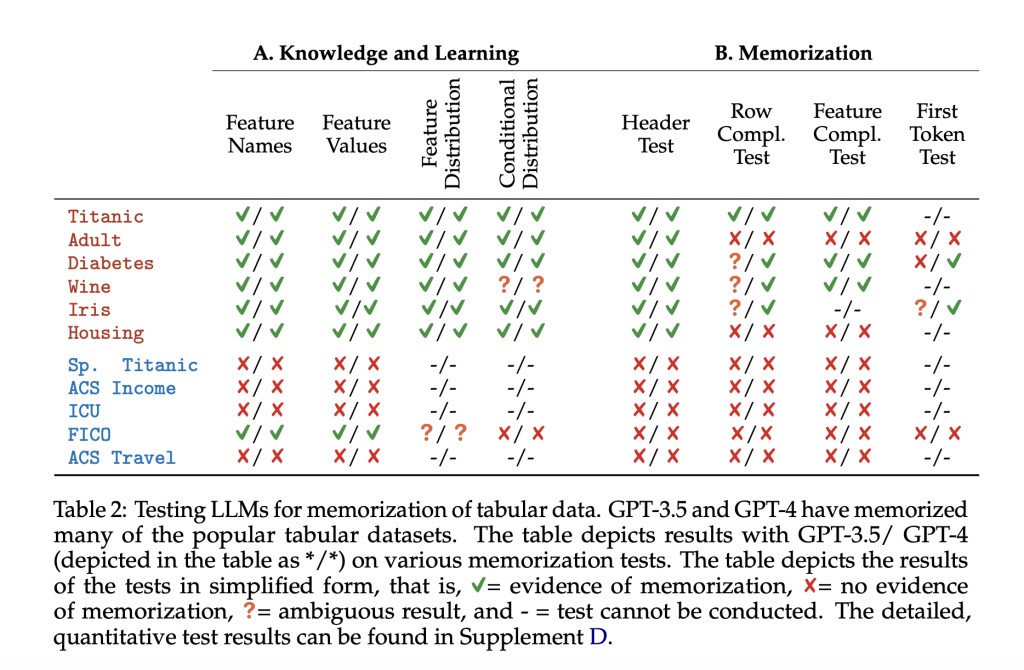Large Language Models (LLMs) have emerged as a cornerstone in artificial intelligence, proficiently managing various tasks from natural language processing to complex decision-making processes. However, as these models grow in sophistication, they also encounter significant challenges, particularly concerning data memorization. This phenomenon raises substantial questions about the models’ ability to generalize across different types of data, especially tabular data, which remains a critical area of concern within the field.
Memorization in LLMs is a double-edged sword. While it enables models like GPT-3.5 and GPT-4 to excel in tasks involving familiar datasets, it also predisposes them to overfit, where performance on new, unseen datasets may not meet expectations. The core issue is how these models retain and recall specific datasets they were exposed to during training, affecting their predictive accuracy and reliability when faced with new data.
In current practice, several techniques are employed to determine whether an LLM has previously encountered a specific dataset. These include methods that assess the ability of a model to reproduce dataset-specific details verbatim. Such techniques are vital for discerning whether an LLM’s impressive performance stems from genuine learning or merely recalling training data. The research introduces a variety of new methodologies to enhance the detection of memorization, including using what the researchers call ‘exposure tests’ to measure how LLMs process and potentially memorize training data precisely.
Researchers from the University of Tubingen, Tubingen AI Center, and Microsoft Research introduced the Header Test, Row Completion Test, Feature Completion Test, and First Token Test. These tests are designed to probe different aspects of memorization and provide insights into how the model internalizes data during training. For instance, the Header Test examines if the model can reproduce the initial rows of a dataset verbatim, indicating that it has memorized those specific entries.
The study’s findings reveal a nuanced picture of memorization and its impacts on model performance. When analyzing the few-shot learning capabilities of LLMs, the research shows that models like GPT-3.5 and GPT-4 perform significantly better on datasets they have seen during training than completely new ones. For example, GPT-3.5 demonstrated a predictive accuracy rate of 0.96 on memorized datasets in its original format, a figure that notably drops to 0.62 under perturbed conditions. This stark difference underscores the potential limitations of relying too heavily on memorization.
The study highlights that memorization can lead to high performance on familiar tasks, but it doesn’t necessarily equip LLMs to tackle new challenges effectively. In scenarios involving novel datasets, the performance of these models generally remains robust. Yet, they exhibit no significant advantage over traditional statistical methods like logistic regression or gradient-boosted trees, suggesting that their success in unfamiliar territories hinges more on generalized learning than memorization.
In conclusion, the research paper presents a compelling analysis of the implications of memorization in LLMs, particularly focusing on tabular data. It underscores the importance of developing methods to detect and mitigate the effects of data memorization to prevent overfitting and ensure that LLMs can perform reliably across various domains. As LLMs evolve, balancing the thin line between memorization and generalization becomes paramount in harnessing their full potential while ensuring their applicability in real-world scenarios. The findings from this study contribute to understanding LLMs’ operational dynamics and guide future developments in AI research, aiming for models that are as adept at handling novel situations as familiar ones.
Check out the Paper and Github. All credit for this research goes to the researchers of this project. Also, don’t forget to follow us on Twitter. Join our Telegram Channel, Discord Channel, and LinkedIn Group.
If you like our work, you will love our newsletter..
Don’t Forget to join our 40k+ ML SubReddit
Want to get in front of 1.5 Million AI Audience? Work with us here
The post Evaluating World Knowledge and Memorization in Machine Learning: A Study by the University of Tübingen appeared first on MarkTechPost.
Source: Read MoreÂ

